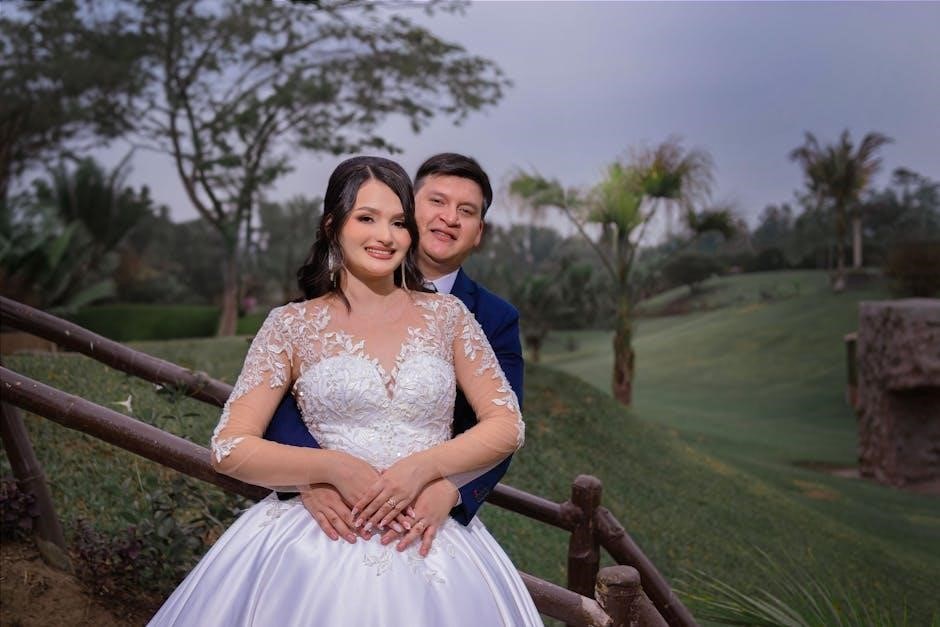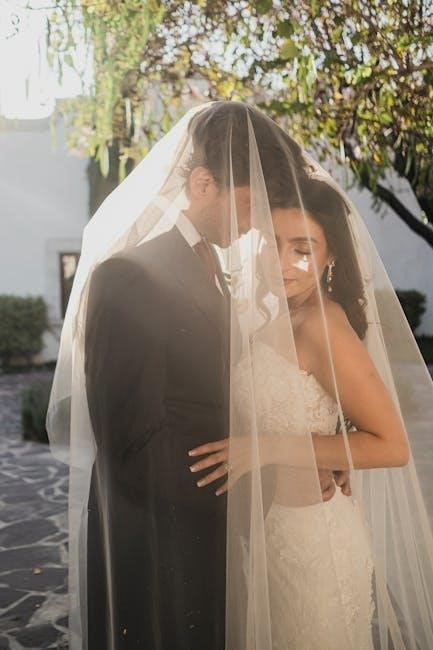A Christian wedding is a sacred celebration uniting two souls in marriage, reflecting faith, commitment, and divine grace. It typically includes biblical readings, vows, and prayers, emphasizing God’s role in the union.
1.1. Significance of Christian Weddings

A Christian wedding holds profound spiritual significance, symbolizing a divine institution and covenant between two individuals before God. It reflects God’s love and unity, emphasizing faith, commitment, and mutual respect. The ceremony is a sacred celebration where vows are exchanged, and rings are blessed, symbolizing eternal devotion. It is a public declaration of love and a lifelong partnership rooted in biblical principles, strengthening the couple’s bond and their relationship with God.
1.2. Overview of the Ceremony Structure
A Christian wedding ceremony typically follows a structured format, beginning with the entrance and welcome, followed by biblical readings, a sermon, and the exchange of vows. The couple then participates in a ring exchange, symbolizing their commitment. The ceremony concludes with a benediction and closing prayer, seeking God’s blessings for their union. This structured approach ensures a meaningful and spiritually enriching experience, reflecting the couple’s faith and devotion.

The Order of a Christian Wedding Ceremony
A Christian wedding ceremony follows a structured sequence, beginning with the entrance, followed by biblical readings, a sermon, vows, ring exchange, and concluding with a benediction.
2.1. Entrance and Welcome

The ceremony begins with the entrance of the wedding party, led by the groom, who awaits the bride at the altar. The bride, escorted by her father or another significant figure, enters to a solemn hymn or music, symbolizing her commitment. Guests rise in respect as she approaches. The pastor then welcomes everyone, offering an opening prayer to set a reverent tone, inviting all to witness and bless the union. This moment marks the official start of the sacred celebration.

2.2. Biblical Readings and Sermon
Biblical readings, such as 1 Corinthians 13 and Ephesians 5, are central to the ceremony, emphasizing love and unity. The sermon follows, offering teachings on marriage as a divine institution. This segment deepens the spiritual significance of the union, guiding the couple in their commitment. The readings and sermon provide a sacred foundation, preparing the couple and congregation for the vows and exchange of rings, all under God’s grace.
2.3. Wedding Vows and Ring Exchange
The wedding vows are personal promises exchanged by the couple, expressing commitment and devotion. The ring exchange symbolizes eternal unity, with each ring serving as a visible bond of their covenant. Often, the groom places the ring on the bride’s finger, declaring, “With this ring, I thee wed.” This sacred moment is accompanied by prayer, seeking divine guidance and blessing for their marriage. It is a profound expression of their faith and lifelong dedication to one another.
2.4. Benediction and Closing Prayer
The ceremony concludes with a benediction, a final blessing from the pastor, invoking divine grace upon the newlyweds. This prayer often seeks joy, harmony, and faithfulness in their marriage. The pastor may also declare the couple husband and wife, officially uniting them in the eyes of God and the congregation. This moment is a heartfelt farewell, sending the couple into their new life together with spiritual guidance and assurance of God’s presence in their union.

Key Elements of a Christian Wedding
A Christian wedding centers on biblical teachings, with key elements including the pastor’s guidance, sacred vows, and the symbolic exchange of rings, all rooted in faith and tradition.
3.1. The Role of the Pastor
The pastor plays a central role in a Christian wedding, officiating the ceremony, delivering a sermon, and leading prayers. They guide the couple spiritually, ensuring the ceremony aligns with Christian teachings. The pastor also advises the couple pre-marriage, emphasizing the sanctity of the union. Their presence adds spiritual depth, making the ceremony meaningful and reverent. The pastor’s involvement ensures the celebration honors God and reflects biblical principles, providing a foundation for the marriage.
3.2. Importance of Biblical Readings
Biblical readings are a cornerstone of Christian weddings, offering spiritual guidance and inspiration. Scriptures like 1 Corinthians 13 emphasize love’s true meaning, while Ephesians 5 highlights mutual respect. These passages provide a divine foundation for the marriage, reminding the couple of God’s plan for their union. The readings also comfort and encourage the congregation, fostering a reverent atmosphere. By incorporating Scripture, the ceremony deepens the couple’s commitment and connects their vows to eternal truths, making the occasion profoundly meaningful and sacred.
3.3. The Exchange of Vows
The exchange of vows is a heartfelt and solemn moment in a Christian wedding. The couple publicly declares their commitment to one another, promising love, fidelity, and mutual support. These vows are personal promises rooted in faith, expressing their devotion and unity. They are often spoken with sincerity, reflecting a deep reliance on God’s guidance. The vows serve as a covenant, sealing their bond and establishing a lifelong partnership grounded in trust, respect, and enduring love, as emphasized in the Bible.
3.4. The Ring Ceremony
The ring ceremony is a sacred moment in Christian weddings, symbolizing eternal commitment and unity. The couple exchanges rings, blessed by the pastor, as a visible sign of their covenant. Each ring represents a promise of fidelity and love, sealed in faith. The act of placing the ring on the spouse’s finger signifies a lifelong bond, with God as their witness. This ritual embodies the couple’s dedication to one another, reflecting their trust in divine guidance and mutual support, now and forevermore.
Prayers and Blessings in the Ceremony
Prayers and blessings are central to Christian weddings, seeking divine guidance and grace. The ceremony includes an opening prayer, a prayer for the couple, and a blessing of the rings, emphasizing faith and unity in marriage.
4.1. Opening Prayer
The opening prayer in a Christian wedding sets a reverent tone, invoking God’s presence and blessings. It expresses gratitude for the couple’s union, seeking divine guidance and grace. The prayer often includes thanksgiving for the couple’s journey, a request for wisdom, and a blessing for their marriage. This moment invites all present to reflect on the sacredness of the ceremony and the commitment being made. It symbolizes the couple’s faith and reliance on God as they begin their life together.
4.2. Prayer for the Couple
The prayer for the couple is a heartfelt moment, seeking divine blessings for their marriage. It asks for wisdom, love, and strength to guide their relationship. This prayer emphasizes unity, faith, and mutual respect, while also requesting protection and joy in their journey together. It serves as a spiritual foundation, reminding the couple of their commitment and God’s role in their union. The prayer is a pivotal part of the ceremony, reflecting the couple’s faith and reliance on divine guidance.

4.3. Blessing of the Rings
The blessing of the rings is a sacred moment in the ceremony, where the pastor invokes divine grace upon the wedding bands. The rings symbolize eternal commitment and unity. The pastor prays for the rings to serve as reminders of the couple’s vows and faith. As the couple exchanges the rings, they are understood as tangible symbols of their promise before God. This blessing reinforces the marriage’s spiritual foundation, seeking guidance and strength for their shared journey.

The Role of Family and Witnesses
Family and witnesses gather to celebrate and witness the union, offering support and participating in prayers or readings, symbolizing their role in the couple’s spiritual journey.
5.1. Participation of the Wedding Party
The wedding party, including the best man, maid of honor, groomsmen, and bridesmaids, plays a vital role in supporting the couple. They assist with preparations, manage rings, and participate in the ceremony. Their presence adds emotional and spiritual support, emphasizing unity and shared joy. Some may also contribute through readings or prayers, deepening the ceremony’s meaning. Their involvement reflects the community’s celebration of the couple’s commitment, blending tradition and personal touches.
5.2. Involvement of Family Members
Family members play a meaningful role in Christian weddings, often participating in readings, prayers, or cultural traditions. The father may escort the bride, symbolizing her transition to married life. Mothers might light unity candles or offer blessings. Siblings or relatives could serve as readers or singers, adding personal touches. Their involvement strengthens familial bonds and highlights the community’s support for the couple’s union, blending tradition with heartfelt contributions.
5.3. Witnesses and Their Significance
Witnesses hold a vital role in Christian weddings, providing validation and support. They represent the community and often serve as prayer partners. Typically, two witnesses sign the marriage certificate, formalizing the union. Their presence underscores accountability and celebration, reflecting the couple’s commitment. Witnesses may also participate in ceremonies, such as lighting unity candles or offering blessings, symbolizing their endorsement of the marriage. Their involvement is both legal and symbolic, enriching the ceremony’s meaningfulness.
Cultural and Traditional Elements
Christian weddings often blend cultural traditions with religious practices, creating a meaningful celebration. Music, hymns, and symbolic rituals enhance the ceremony, reflecting the couple’s heritage and faith.
6.1. Traditional Christian Wedding Practices
Christian weddings often include a procession, where the bride is escorted down the aisle, symbolizing her family’s blessing. The pastor leads the ceremony, emphasizing the sacred covenant. Traditional practices include exchanging vows, rings, and a benediction, with the community witnessing the union. These customs reflect faith, commitment, and divine grace, creating a meaningful celebration rooted in spiritual values and timeless rituals.
6.2. Incorporating Cultural Elements
Cultural elements enrich Christian weddings, blending traditions with faith. Many couples incorporate local music, attire, or dances, creating a unique celebration. For example, traditional garments or bilingual readings honor heritage. Some ceremonies include cultural symbols, reflecting the couple’s roots. These elements complement the religious aspects, ensuring the ceremony remains meaningful while celebrating diversity. They highlight the union’s uniqueness, blending faith with cultural identity for a personalized and memorable experience.
6.3. Music and Hymns
Music and hymns are integral to Christian weddings, creating a reverent atmosphere. Traditional hymns like “Amazing Grace” or “How Great Thou Art” are often sung, reflecting the couple’s faith. Some ceremonies include contemporary songs or instrumental pieces, while others feature choirs or soloists. Music serves as a unifying element, connecting attendees and celebrating the sacred union. It enhances the emotional depth of the ceremony, glorifying God while honoring the couple’s commitment to one another.
Planning and Preparing for the Ceremony
Planning a Christian wedding involves selecting a venue, choosing attire, and creating a program. It ensures the ceremony reflects the couple’s faith and personal style, honoring traditions while celebrating their union.
7.1. Choosing the Venue

Selecting a venue for a Christian wedding is a pivotal decision, often involving a church or a location that resonates with the couple’s faith. The venue should accommodate guests comfortably while maintaining a sacred ambiance. Many couples opt for a church to emphasize the spiritual significance of the ceremony. Alternatively, outdoor or historic venues can be chosen, provided they align with the solemnity of the occasion. The venue’s availability, aesthetic appeal, and ability to host both the ceremony and reception are key considerations.
7.2. Selecting Appropriate Attire
Choosing attire for a Christian wedding involves modesty and reverence, reflecting the sacred nature of the ceremony. The bride often wears a white wedding dress, symbolizing purity, paired with a veil. The groom typically wears a tailored suit, often in neutral tones. Bridesmaids and groomsmen dress formally, complementing the couple’s choices. Accessories like jewelry and flowers are kept simple to avoid distraction. The attire should honor the spiritual significance of the occasion while expressing personal style and cultural traditions.
7.3. Creating a Ceremony Program
A ceremony program outlines the order of events, ensuring clarity and structure. It typically includes the processional, readings, hymns, vows, and recessional. Names of participants, such as the pastor, musicians, and wedding party, are listed. The program may also feature selected Bible verses or lyrics to engage guests. Distributing it allows everyone to follow along, fostering a sense of unity and reverence during the sacred celebration of the Christian wedding.
A Christian wedding ceremony is a sacred union celebrating love, faith, and commitment. It reflects a deep connection with God, guiding the couple’s journey together.
8.1. Final Thoughts on the Ceremony
A Christian wedding ceremony is a profound celebration of love, faith, and commitment. It unites not only the couple but also their families and community in prayer and joy. The exchange of vows, biblical readings, and blessings underscore the sacred nature of marriage. This ceremony serves as a foundation for the couple’s life together, reminding them of God’s presence and guidance. It is a moment of lasting impact, shaping their future with grace and unity.

8.2. The Lasting Impact of the Ceremony
A Christian wedding ceremony leaves a lasting impact, marking the beginning of a lifelong journey rooted in faith and mutual commitment. The vows, prayers, and blessings create a spiritual foundation, guiding the couple through life’s challenges. It strengthens their bond with God and each other, fostering a relationship built on love, trust, and shared values. The ceremony’s influence extends beyond the day, shaping their future with grace, unity, and purpose, as they grow together in faith and marriage.
Comments